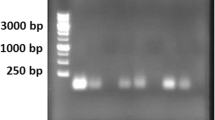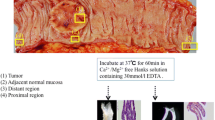Abstract
OBJECTIVE To study the microsatellite instability (MSI) and methylation state of the hMLH1 gene promoter and their mechanisms underlying the development of gastric cancer.
METHODS Forty-one gastric cancer samples were obtained from patients undergoing surgery and 46 chronic atrophic gastritis tissues with dysplasia or intestinal metaplasia (IM) were obtained from patients undergoing gastro-endoscopy. Fourteen normal gastric mucosal samples were used as controls. Genomic DNA was extracted from the samples and 5 microsatellite markers were used to measure MSI. Methylation — specific PCR (MSP) was used to screen the methylation state of the samples. DNA sequencing and immunohistochemistry were performed to verify the results.
RESULTS MSI was identified in 22 out of the 41 (53.7%) gastric cancers, of which 8 cases showed high-level MSI (2 or more loci altered) and 14 showed low-level MSI (1 locus altered). MSI was also detected in 12 out of 46 (26.1%) pre-cancerous lesions of the stomach, whereas it was not seen in the normal tissue. Moreover, hMLH1 hypermethylation was detected in 17 out of the 41 (41.5%) gastric cancers, 9 out of the 46 (19.6%) pre-cancerous lesions and 0 out of the 14 normal tissue. Significant differences in frequency of MSI and hMLH1 promoter methylation were observed among gastric cancers, precancerous lesions and normal gastric tissue. Gastric samples with MSI had a tendency to be hypermethylated in the hMLH1 promoter. DNA sequencing and immunohistochemistry results also confirmed that hMLH1 promoter methylation could lead to loss of the hMLH1 protein and gene silence which sequentely resulted in gene mismatch and MSI.
CONCLUSION Accumulation of MSI and hMLH1 promoter methylation may be important early molecular events during gastric carcinogenesis and may contribute to the acquisition of a transformed cell phenotype and the development of gastric cancer.
Similar content being viewed by others
References
Richter TM, Tong BD, Scholnick SB. Epigenetic inactivation and aberrant transcription of CSMD1 in squamous cell carcinoma cell lines. Cancer Cell Int. 2005;5:29.
Kaneda A, Tsukamoto T, Takamura-Enya T, et al. Frequent hypomethylation in multiple promoter CpG islands is associated with global hypomethylation, but not with frequent promoter hypermethylation. Cancer Sci. 2004;95:58–64.
Xu XL, Yu J, Zhang HY, et al. Methylation profile of the promoter CpG islands of 31 genes that may contribute to colorectal carcinogenesis. World J Gastroenterol. 2004;10:3441–3454.
Zhao ZS, Zhou JL, Yao GY, et al. Correlative studies on bFGF mRNA and MMP-9 mRNA expressions with microvascular density, progression, and prognosis of gastric carcinomas. World J Gastroenterol. 2005;11:3227–3233.
Leung SY, Yuen ST, Chung LP, et al. hMLH1 promoter methylation and lack of hMLH1 expression in sporadic gastric carcinomas with high-frequency microsatellite instability. Cancer Res. 1999;59:159–164.
Boland CR, Thibodeau SN, Hamilton SR, et al. A National Cancer Institute Workshop on Microsatellite Instability for cancer detection and familial predisposition: development of international criteria for the determination of microsatellite instability in colorectal cancer. Cancer Res. 1998;58:5248–5257.
Ganaraj A, Kuhn JA, Jones RC, et al. Predictors for nonsentinel node involvement in breast cancer patients with micrometastases in the sentinel lymph node. Proc (Bayl Univ Med Cent). 2003;16:3–6.
Iino H, Jass JR, Simms LA, et al. DNA microsatellite instability in hyperplastic polyps, serrated adenomas, and mixed polyps: a mild mutator pathway for colorectal cancer? J Clin Pathol. 1999;52:5–9.
Herman J. G, Umar A, Polyak K, et al. Incidence and functional consequences of hMLH1 promoter hypermethylation in colorectal carcinoma. Proc Natl Acad Sci. 1998;95:6870–6875.
Fleisher AS, Esteller M, Wang S, et al. Hypermethylation of the hMLH1 gene promoter in human gastric cancers with microsatellite instability. Cancer Res. 1999;59:1090–1095.
Author information
Authors and Affiliations
Corresponding author
About this article
Cite this article
Wang, D., Xu, Y., Geng, X. et al. Analysis of inactivation of hMLH1 by promoter hypermethylation and microsatellite instability in gastric carcinogenesis. Chin. J. Clin. Oncol. 3, 102–109 (2006). https://doi.org/10.1007/s11805-006-0082-4
Received:
Accepted:
Issue Date:
DOI: https://doi.org/10.1007/s11805-006-0082-4




